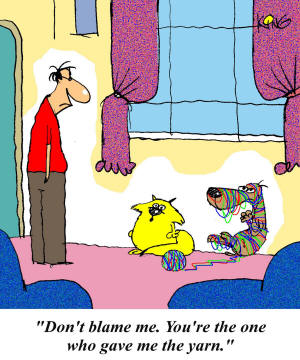What is destructive chewing?
Have you ever received flowers only to have
your cat knock over the vase, chew on them and then throw up?
Have you replaced all of your live plants with plastic ones
to avoid your cat nibbling on indoor plants? Has your cat destroyed socks or or chewed holes in
items such as cotton T-shirts left on the floor or bed?
If so, this topic is for you! While, most people don't think of cats as
destructive chewers, some cats are inclined this way and can destroy household items rather rapidly.
Cats, like dogs, chew for a variety of reasons.
|
Most important of all...PRAISE any interest
your cat shows in safe toys. Play with the safe toy yourself and encourage
your cat to chase and bite the toy.
|
Why do some cats destructively chew?
Usually, cat chewing is related to exploration, play, teething, boredom or stress (anxiety).
All cats chew when they are young, as a result of teething or exploring the world. It is normal for cats to increase
chewing as adult teeth erupt below the gum line and put
pressure on baby teeth. Adult teeth begin to break through in kittens at
about 4 months of age.
Chewing helps dislodge the baby teeth so the adult
teeth can replace them. Chewing also helps the teeth become solid in the mouth as it exercises the
connection between the bone and the teeth. Chewing may reduce the discomfort
associated with teething.
If kittens are not encouraged to chew on safe toys, they may simply choose whatever interests them. Remember,
your cat cannot tell the difference between a cat toy and your child's favorite toy! Be a positive pet parent and help
your cat learn the difference.
For safety reasons, provide chew toys that are not consumable. |
Why is it important to correct
destructive chewing?
When cats chew on non-food items such as houseplants, they are vulnerable to the
dangers of poisonous plants. Cats that chew on fabric are at risk for swallowing
threads or other patches of fabric that is being chewed. Many surgical emergencies
have resulted from intestinal blockages. These blockages can be due to a small toy, clothing, thread, plastic bags, or anything small enough to go in the cat's mouth
but not all the way through the cat's intestinal system.
Cats that like to chew also tend to be destructive, often alienating the family. Family
members often resort to punishing cats for destructive chewing. Punishment does
not help the cat learn better ways to satisfy the natural need to chew.
Punishment only decreases the cat's trust in the family and rarely teaches the cat to stop the unwanted behavior .
|
What to do
1. Give your cat an assortment of toys that are chewable
but not destructible.
2. Make toys tasty by rubbing chicken or tuna juice on
them.
3.
Praise your cat for chewing on the right things.
4. Select toys
for interactive, daily play sessions with your cat that are also safe to chew
during play.
5.
Rotate toys, keeping a few down at a time, to keep
them interesting to your cat.
If you try these steps and see little to no
results, consider calling for a Pet Behavior History Analysis and Consultation
with a Veterinary Behavior Consultant.
